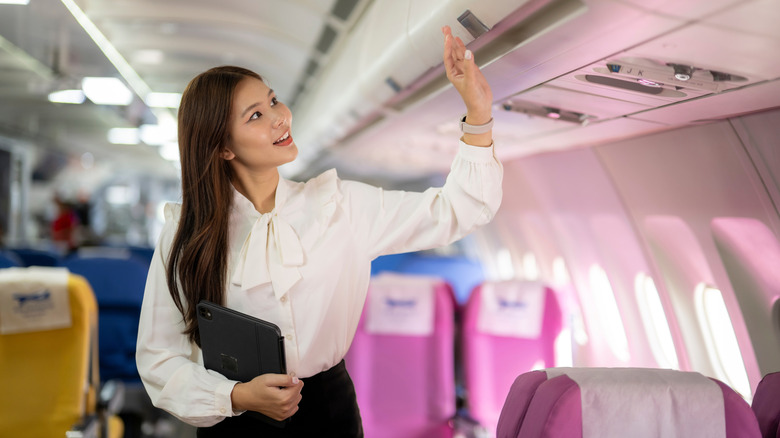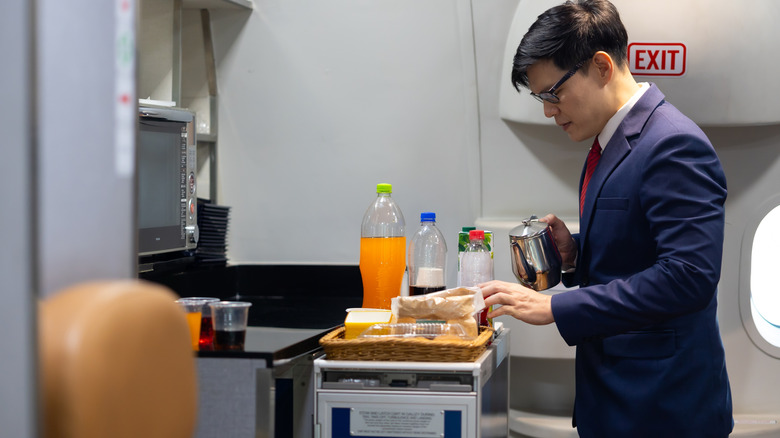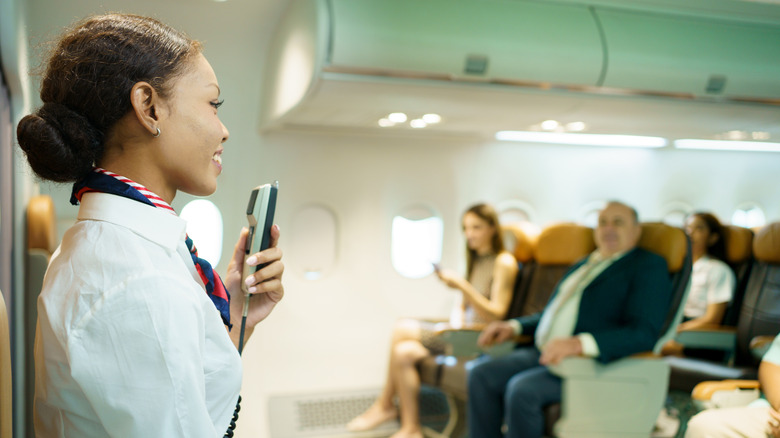What It Really Costs To Become A Flight Attendant
They say to find a job you love so you'll never have to work a day in your life. For those who travel more than the casual flyer, becoming a flight attendant is maybe something you've considered. It's no easy task — it's a competitive industry with a unique career path that takes time and a decent chunk of money to complete. But with an average income of just over $47,000 (according to ZipRecruiter's latest benchmarks) and tons of travel perks, the best parts of being a flight attendant make it well worth the hustle and investment for many.
Becoming a flight attendant deviates from other professions in the way that much of the training is provided by the airline you'll be working for. In other words, applying for open positions comes first, and learning the ins and outs of the trade comes later. For most major airlines, flight attendant training is completely free for the student — it'll just cost you about two and a half months of intense in-person training and studying. Depending on the airline, the training period could be paid or unpaid, and most often, your living expenses are covered during that time. For a premium, you can enroll in private academies for additional certifications to beef up your resume and give you a competitive edge.
Most airlines cover your costs whilte training
Flight attendants are the primary point of contact between flyers and airlines. All candidates who've been accepted must join the flight attendant training program provided by the airline. For most airlines, the training itself (courses, tests, etc.) will not cost you, the trainee, anything. If you successfully pass the training period, then congratulations! Off you go to do what many consider a dream job.
What about other kinds of training? Well, most airlines will not require college degrees, but obtaining a diploma in tourism or aviation will be a huge leg-up. There are dedicated flight attendant schools that can be good alternatives to traditional colleges, with courses more directly related to the job. These training programs can cost anywhere between $3,000 to over $10,000, with some institutions offering financial aid. These extra certifications rarely appear in the requirements you'll see from major airlines and are totally optional, but they can provide a solid foundation before joining the official training program from your chosen airline.
Depending on where you apply, this training period can be paid or unpaid. Delta, for example, offers a training wage and some meals, with lodging for those who live more than 25 miles from the training facility. American Airlines' training period is unpaid, but your food, board, and flight to and from the course are provided. Unfortunately, other airlines may not offer any kind of financial support, meaning you're left on your own to cover the costs of a place to stay, transportation, and sustenance.
Before applying, you'll need to meet the basic requirements and get relevant experience
All airlines will require candidates to possess, at the very least, a high school diploma or its equivalent. If you don't have one, then the first expense would be that of a GED. Receiving any certification or diploma from tourism-related courses or curricula can also be advantageous when applying for jobs. American Airlines requires that candidates have some prior customer service experience. This is not industry standard, but it'll be valued highly if featured on your resume.
Language skills can be part of the minimum requirements, depending on the airline's busiest destinations or future needs. It's generally best to pick up a second language (focusing on speaking and listening skills) and take a language proficiency test. Language tests are relatively inexpensive — the biggest cost here will be time. Alternatively, if you are a non-native English speaker, having proof of fluency will help immensely.
Before investing your time and effort into the aviation industry, you should be sure that this is your chosen career path. There are unusual rules and requirements for being a flight attendant, from upkeeping an impeccable appearance to maintaining a level of physical fitness that allows you to easily maneuver around an aircraft. For example, flight attendants are required to wear watches in case of planned emergencies, with some airlines having rules about which style of watch is acceptable and which aren't. If you're seriously considering this career path, it's good to consider all the criteria expected of those in this position.


